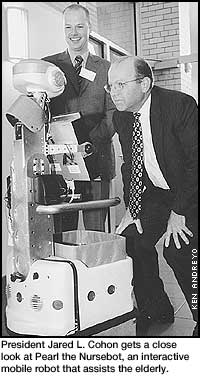|
|
||
|
|
|

Medical Robotics Center Established
Carnegie Mellon has announced the formation of a new Medical Robotics and Information Technology Center (MERIT) that will focus on creating new robotic technologies to benefit the healthcare industry.
The interdisciplinary center will merge Carnegie Mellon's strengths in robotics, computer science, information technology and engineering to create computer-based tools to assist surgeons in minimizing invasive medical procedures and improving patient outcomes.
Principal investigators of the MERIT Center are orthopedic surgeon and alumnus Dr. Anthony DiGioia (E 1979, E 1982), Takeo Kanade, the U.A. and Helen Whitaker university professor of computer science and robotics, and Ken Gabriel, professor of electrical and computer engineering and robotics.
Gabriel, who specializes in microelectromechanical systems (MEMS), said the new center is a "partnership between medicine and technology."
In the MEMS Lab, co-directors Gabriel and Gary Fedder, associate professor of electrical and computer engineering, are leading a team of researchers who are developing miniature high-performance sensors and controls that help information systems sense, act and compute.
Senator Arlen Specter (R-Pa.) joined Carnegie Mellon President Jared L. Cohon in announcing the establishment of the new center at a press conference in Newell-Simon Hall on May 29. Senator Specter pledged his support for federal funding of the new center.
"What is being done here is enormously impressive," Specter said. "This is a community on the move, and high technology is a big factor. I like what I see. I pledge my support for your future achievements."
On display at the press gathering were several medical robotic technologies already in clinical practice, including HipNav, a computer-aided system developed by a team of researchers led by DiGioia and Kanade that helps the surgeon accurately place implants during total hip replacement surgery.
DiGioia has conducted more than 200 hip replacements by using HipNav technology. His patients have included Sal Sirabella, deputy mayor of Pittsburgh, and Jim Tomayko, director of the Master of Software Engineering program at Carnegie Mellon and president of the university's Alumni Association.
Also on exhibit was a new Image Overlay technology that gives surgeons virtual "x-ray vision," and Pearl the Nursebot, an interactive mobile robot that assists the elderly. Pearl was developed by a team led by Sebastian Thrun of Carnegie Mellon's Center for Automated Learning and Discovery.
"Pearl is a very impressive young woman," Specter said. "What she can do is remarkable."
The MERIT Center broadens the university's involvement in medical robotics, which began in 1993 when the Robotics Institute formed the Center for Medical Robotics and Computer-Assisted Surgery. In 1998, Carnegie Mellon researchers joined colleagues from Johns Hopkins University and the Massachusetts Institute of Technology in the National Science Foundation's Engineering Research Center in Computer-Integrated Surgical Systems and Technology. Kanade is an associate director of the center.
"Medical robotics combines what humans do well with what machines do well," said DiGioia, who earned his bachelor's and master's degrees in civil and environmental engineering at Carnegie Mellon. "The new center will help us to create the medical toolbox of the future."
DiGioia said these "tools" will reduce medical errors and improve patient outcomes. He also said the center has the potential to help create a new industrial base in the city and help bolster economic development efforts in Pittsburgh. MERIT is expected to attract commercial partners and help spin off new medical technology companies.
Bruce Gerson
|
|
This Issue's Headlines || Carnegie Mellon News Home || Carnegie Mellon News Service || Carnegie Mellon Home |
||